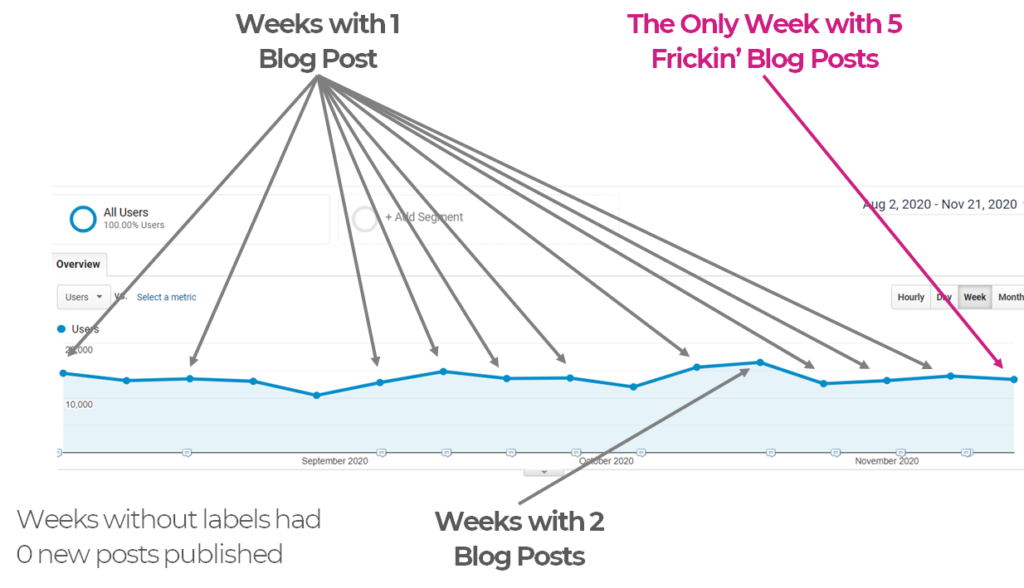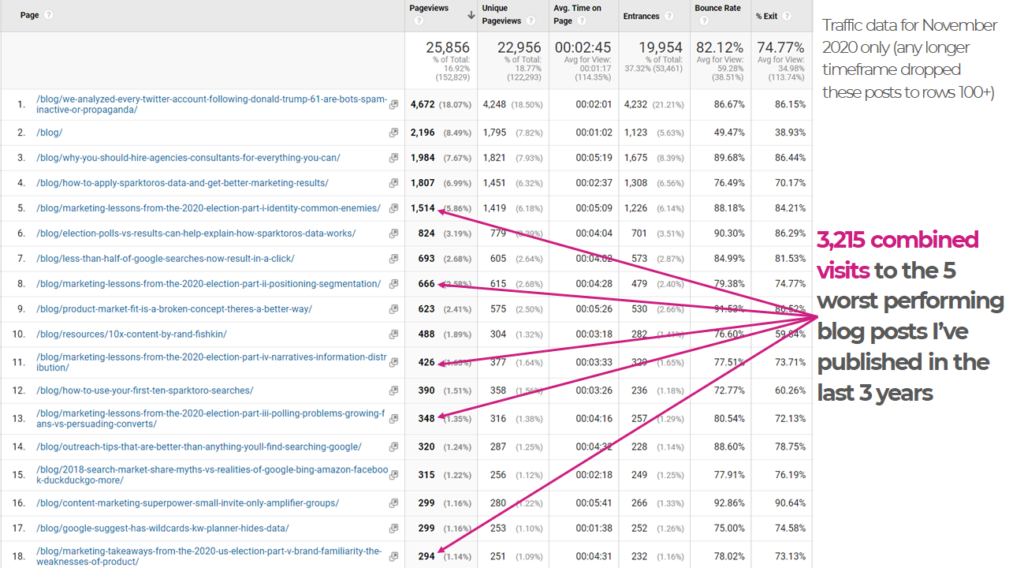Friends, I want you to look at a Google Analytics traffic graph with me. It’s not pretty, but sometimes we can learn more from failures than from success.
You see that, too, right? In the week of November 15-21, SparkToro’s website saw a slight decline in traffic that, for most of this year, only happens when we don’t publish anything new. But, during that Nov. 15-21 week, I did publish. In fact, I published more actively than in other week of the site’s 2.5 year existence.
Those five posts were all part of an intensive series examining the marketing takeaways from the 2020 election. They included:
- Part I: Identity & Common Enemies (Sunday night)
- Part II: Positioning & Segmentation (Monday night)
- Part III: Polling Problems & Growing Fans vs. Persuading Converts (Tuesday night)
- Part IV: Narratives & Information Distribution (Wednesday night)
- Part V: Brand Familiarity & The Weakness of Product (Thursday night)
That week was not only the most active publishing week I’ve had in the last few years, it was also the most work-intensive. In addition to my normal duties, I stayed up late writing every evening, an endeavor usually reserved for just one or two midnight oil evenings a week. Given the struggling traffic to the posts, I also did a bit more social promotion than I usually do for my content (apologies to my Twitter + LinkedIn followers, who probably felt spammed by links they never clicked).
Here’s a breakdown of the blog posts in GA’s content report:
Ooph. Not good, Rand. During the week they were published, all five posts performed worse than any other post I’ve written on this blog, an ignominious quintet.
Why Did These Posts Underperform So Badly?
When a post underperforms, a handful of four suspects are usually to blame: Topic, quality, timeliness, and value. But, in this case, I’m skeptical those are at fault.
You can see from the blog analytics that SparkToro’s top-performing post of all time is a similar combination of politics, data, and marketing (our analysis of Trump’s Twitter followers), and many of my other politics-meets-marketing content has done well on social channels. The quality of the posts might not be superb, but, even with a relatively critical re-read of the five, I’d put them in, at least, the top half of my recent writing. They’re inarguably timely, coming just after the week of the finalized election results, and during a time when most of the web’s top-performing content is election news & analysis. The last of the big four: value, is tougher to quantify.

Via Gaetano DiNardi on Twitter
It’s entirely possible that value (or one of those other three) *is* responsible, in part or whole, for the underperformance. But, I think in this case, there are more likely hypotheses, and ones that can help all of us produce better-performing content:
- Uncompelling Titles – In the worlds of social distribution, email click-through rates, and viral sharing, titles do 95% of the lifting. With these five posts, the titles, frankly, sucked. Marketing Lessons from the 2020 Election | Part IV: Narratives & Information Distribution may be an accurate description of the post’s content, but it’s a $#%t headline.
- Lack of Singular Focus – Each post in the series tackled two separate, mostly unrelated topics. That’s not always a terrible thing — list posts work very well — but two is the worst number. Three or more can be a list. One can have focus. Two is… bifurcating, divided, abnormally segmented, tough to describe, which means tough to share, which means it won’t get shared, which means… you guessed it: low traffic.
- No Encapsulating Visual – Posts with visuals outperform those without, and while each of the five posts last week had numerous charts, graphs, screenshots, and the like, none were custom-created nor encapsulating of the post’s topic (i.e. the kind of visual that gives you a sense for what’s in the content at a glance). A heap of blame for the underperformance of my social posts promoting the content belongs here.
- Serving Too Many Audiences – Great posts almost always resonate deeply with one particular audience. “Write for one person,” is given as almost universal writing advice, and while a B2B blog like this one should generally serve a wider audience, my best posts always hone in on a single group (usually folks with a particular job role or focus).
- No Keyword Targets – SparkToro’s content has generally been more focused on social, email, viral, and digital PR channels, but there’s no reason for those five posts not to do even a skosh of keyword research and targeting.

Were There Any Positive Takeaways?
Absolutely. The point of *this* post isn’t to wallow in failure or frustration, it’s to show how, with some small changes, those posts could have likely drawn in many multiples of the visits they did. I’m less interested in kicking myself for a week of late night missteps, and actually kinda excited by what I’ll do differently after those errors.
Highest on that list is to add those five, unforced errors above to my blog post checklist process.
But, doing things differently in the future isn’t the only benefit. Last week’s flub also:
- Helped me turn the mentally, emotionally taxing mess of the 2020 election into something more productive. It might not have brought loads of traffic, but hours of research, reading, and marketing-application actually helped me understand some of the reasons people voted the ways they did. Despite the ongoing drama and refusal to conceded from the election’s loser, studying the election with the dispassion of analytical distance was an effective salve
- Reminded me what it takes to publish five nights a week while also being the CEO and founder of a fledgling startup. In my 20s, I did it for years at a stretch when starting my previous company. It’s not something I want to do every week, but I proved to myself it’s possible, and I barely even fell behind on other (professional) tasks. My personal time and romantic life took a hit (sorry Geraldine!), but a salvageable one.
- Re-ignited an old habit, and nudged me into what I hope is fewer weeks in the future without a post. Monday and Tuesday’s posts were excruciating amounts of hours (probably 6-8 each). Friday’s post took only ~3.5 hours to complete.
- Proved how disconnected work input and successful output are. Quantity is pointless. Quality matters. I’d almost certainly have done better publishing any one of the other ideas in my drafts folder. Or even just taking it easy, cooking a few more elaborate meals, playing some video games, and waiting for my brain to bubble up a more compelling idea.
- Reduced my anxiety about failing to write successful posts. So I had a week of demanding, strenuous writing that failed. So what?! It wasn’t the end of the world… Why have I been so worried about every post I write doing well? Get over yourself, Rand!

Maybe, my failure, and this post can help you, too. Even if you’re the only person who reads it, that’d be OK.


